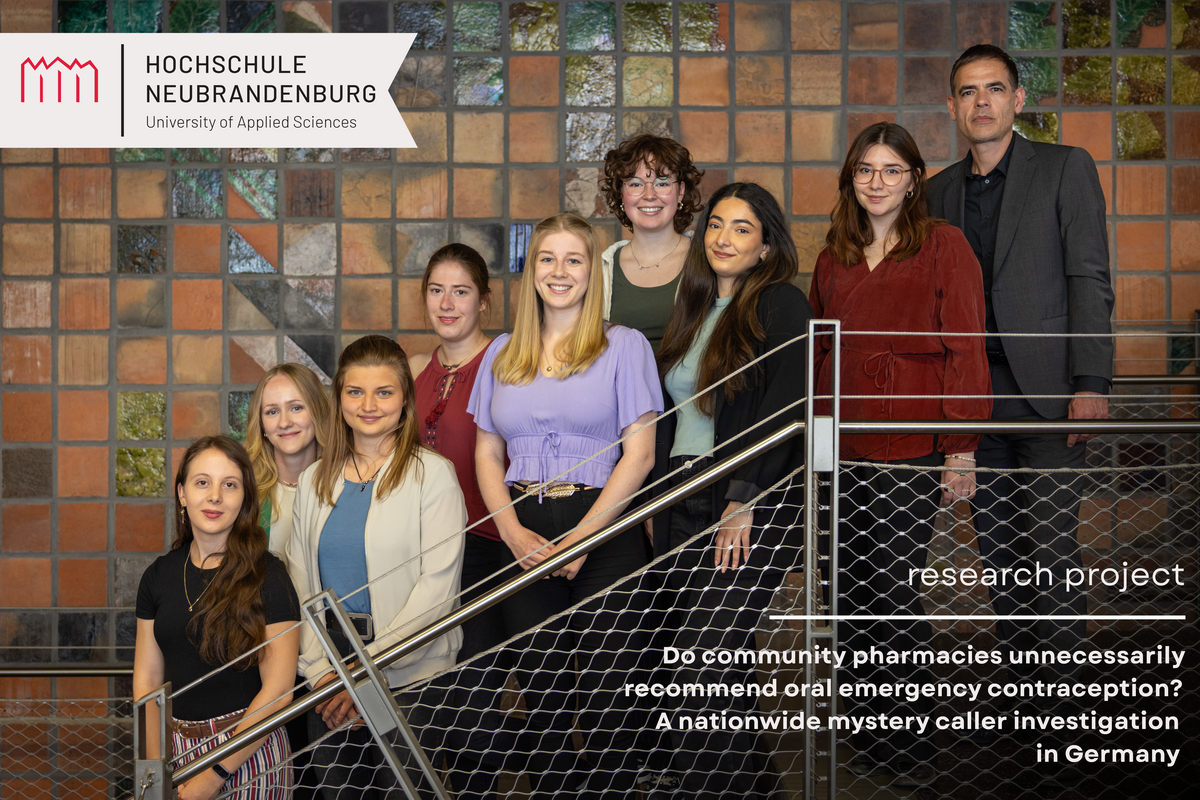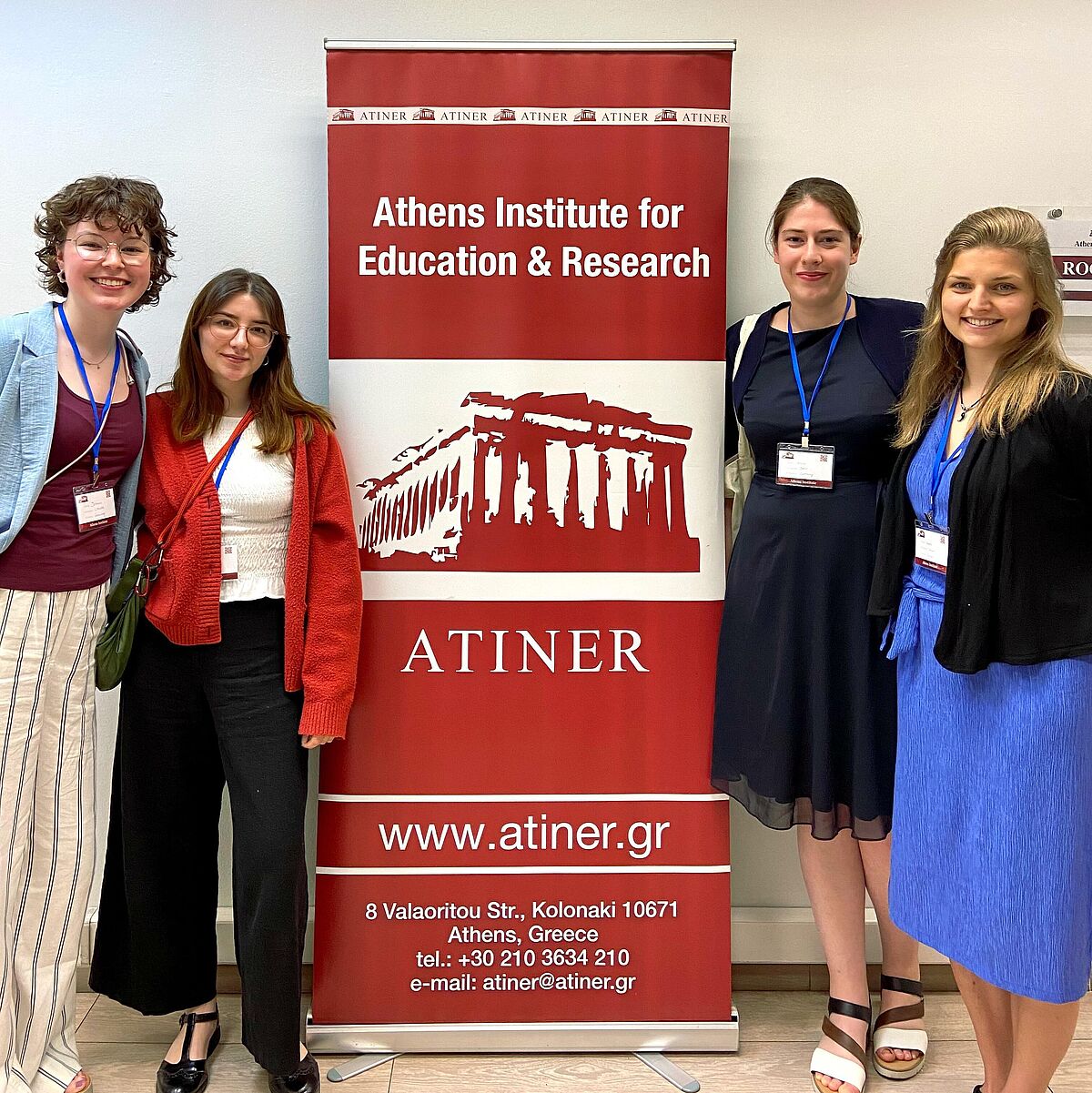Do community pharmacies unnecessarily recommend oral emergency contraception? A nationwide mystery caller investigation in Germany.
Research project duration: 24 September 2023 – 04 April 2025
Research project team (linked to ORCID): Prof. Dr. Bernhard Langer, Anne Beck (B.Sc.), Antonia M. Dreier (B.Sc.), Rosa Gabrieljan (B.Sc.), Hanna Hilgenhof (B.Sc.), Johanna Latuske (B.Sc.), Carolin Priepke (B.Sc.), Katharina Schaihadinow (B.Sc.), Helene Schwarz (B.Sc.)
External researcher (linked to ORCID): Christian Kunow (M.A.)
It was a great experience to conduct this remarkable study in collaboration with eight highly motivated and talented master's students. My heartfelt thanks go to Anne, Antonia, Carolin, Hanna, Helene, Johanna, Katharina and Rosa for their exceptional contributions. I wish you all the best for the future!
Background: To prevent unwanted pregnancy after unprotected intercourse, oral emergency contraceptives (ECs) have been available in Germany without a prescription as over-the-counter (OTC) medicines only in community pharmacies (CPs) since 2015. Apart from the co-payment, the costs are only covered by statutory health insurance under certain conditions, which can lead to financial burdens. Due to the high hormone load and possible side effects, there may also be negative health consequences. This demonstrates the relevance of adequate counseling by the CPs to avoid unnecessary recommendations of oral ECs. The primary aim of the study was therefore to determine whether essential questions are asked by pharmacy staff and what the corresponding recommendation behavior is for a scenario that does not include a recommendation of oral EC as “appropriate outcome” (AO). Secondarily, the potential influence of various independent variables on the AO was determined.
Methods: The study was conducted from 15 July to 22 August 2024 and is based on the “simulated patient methodology” (SPM), internationally known as the “gold standard”, in the form of covert “mystery calls”. This is the first study worldwide to implement such an approach nationwide for the stated study objectives. The study was carried out in a random sample of CPs stratified by federal states and representative of the whole of Germany. Each CP (n = 376) was called once by one of eight trained, female “mystery callers” (MCs) aged between 21 and 24. A second observer was used in every case to ensure the quality of the mystery calls and to collect data. The MCs simulated a situation in which the most prescribed regular combination preparation “Maxim” was forgotten once and intercourse occurred. However, the regular pill can be taken within a twelve-hour time window to maintain contraceptive protection. The possible recommendation of oral EC by pharmacy staff is therefore unnecessary according to the guidelines and checklist of the German Federal Chamber of Pharmacists (BAK).
Results: All 376 planned “mystery calls” were carried out. In 14.4 % of cases (54/376), an exit was made due to premature termination of the mystery call by the CPs. Consequently, 322 cases were included in the analysis. The AO was achieved in 44.4 % of the mystery calls (143/322). A multivariate logistic regression model showed that a higher question score and some MCs proved to be significant predictors for the AO. Additional qualitative information collected from a free text field revealed refusal of telephone advice, misinformation, inappropriate comments and unfriendliness of pharmacy staff as key problem areas.
Conclusion: The results indicate a lack of advice. For this reason, consistent use and explicit recommendation of the BAK checklist for consultations should be considered in the relevant guidelines. A further improvement measure regarding professional and communicative deficits could be appropriate training for pharmacy staff. Despite numerous standardization measures, some MCs were surprisingly shown to have a significant influence on the AO. There is a need for further research, particularly regarding the influence of the MCs' voice.
Latuske, J.; Beck, A.; Schaihadinow, K.; Schwarz, H. (2025): Do community pharmacies unnecessarily recommend oral emergency contraception? A nationwide mystery caller investigation in Germany. Abstract of the 11th Annual International Conference on Public Health, Athens, Greece, June 23–27, 2025. In: Zahariadis, G.; Papanikou, A. (Eds.): Abstract Book. Athens: Athens Institute for Education and Research, pp. 34–35. https://www.atiner.gr/abstracts/2025ABST-PUH.pdf
Beck, A.; Latuske, J.; Schaihadinow, K.; Schwarz, H.; Dreier, A. M.; Gabrieljan, R.; Hilgenhof, H.; Priepke, C.; Kunow, C.; Langer, B. (2025): Do community pharmacies unnecessarily recommend oral emergency contraception? A nationwide mystery caller investigation in Germany. Abstract of the 83rd FIP World Congress of Pharmacy and Pharmaceutical Sciences, Copenhagen, Denmark (accepted).
Langer, B.; Beck, A.; Dreier, A. M.; Gabrieljan, R.; Hilgenhof, H.; Latuske, J.; Priepke, C.; Schaihadinow, K.; Schwarz, H.; Kunow, C. (2025): Do community pharmacies unnecessarily recommend oral emergency contraception? A nationwide mystery caller investigation in Germany (final preparation before submission to PLOS One).
Beck, A.; Latuske, J.; Schaihadinow, K.; Schwarz, H. (2025): Do community pharmacies unnecessarily recommend oral emergency contraception? A nationwide mystery caller investigation in Germany. 11th Annual International Conference on Public Health, Athens, Greece, 23–27 June 2025.
Beck, A.; Latuske, J.; Schaihadinow, K.; Schwarz, H. (2025): Do community pharmacies unnecessarily recommend oral emergency contraception? A nationwide mystery caller investigation in Germany. 83rd FIP World Congress, Copenhagen, Denmark, 31 August – 03 September 2025. (More information about the congress.)

